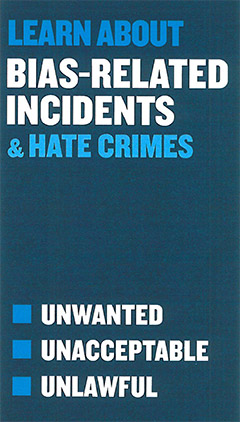Bias & Hate Crimes
Bias-related incidents are behaviors which constitute an expression of hostility, against the person or property of another because of the targeted person's race, religion, sexual orientation, ethnicity, national origin, gender, age, or disability. According to New York Penal Law Section 485, a person commits a hate crime when he or she commits a specified criminal offense and either:
- intentionally selects the person against whom the offense is committed or intended to be committed in whole or in substantial part because of a belief or perception regarding the race, color, national origin, ancestry, gender, religion, religious practice, age, disability or sexual orientation of a person, regardless of whether the belief or perception is correct, or
- intentionally commits the act or acts constituting the offense in whole or in substantial part because of a belief or perception regarding the race, color, national origin, ancestry, gender, religion, religious practice, age, disability or sexual orientation of a person, regardless of whether the belief or perception is correct.

Examples of hate crimes may include, but are not limited to: threatening phone calls, hate mail (including electronic mail), physical assaults, vandalism, destruction of property, and fire bombings. John Jay College is required to report statistical incidence of bias crimes on or around campus annually as part of the Jeanne Clery Disclosure of Campus Security Policy and Campus Crime Statistics Act (the Clery Act). Bias crime statistics can be found in the Public Safety Annual Security Report. The state law regarding dissemination of bias related crime prevention information can be found by accessing this link.
Penalties for bias-related crimes are very serious and range from fines to imprisonment for lengthy periods, depending on the nature of the underlying criminal offense, the use of violence or a previous conviction of the offender. Students, staff or faculty who commit bias crimes are also subject to university disciplinary procedures where a range of sanctions are available including suspension, expulsion or termination of employment.
In order to effectively handle and investigate incidents of bias-related crimes and prevent future occurrences of such crimes, victims or witnesses of a hate crime are encouraged to immediately report incidents to the Department of Public Safety by calling (212) 237-8524. Please remember that any evidence such as graffiti, e-mails, written notes or voice mail messages should be preserved. The Department of Public Safety will investigate and follow the appropriate college adjudication procedures. Victims of bias crimes can also avail themselves to counseling and support services through the Office of Counseling by calling (212) 237-8111.